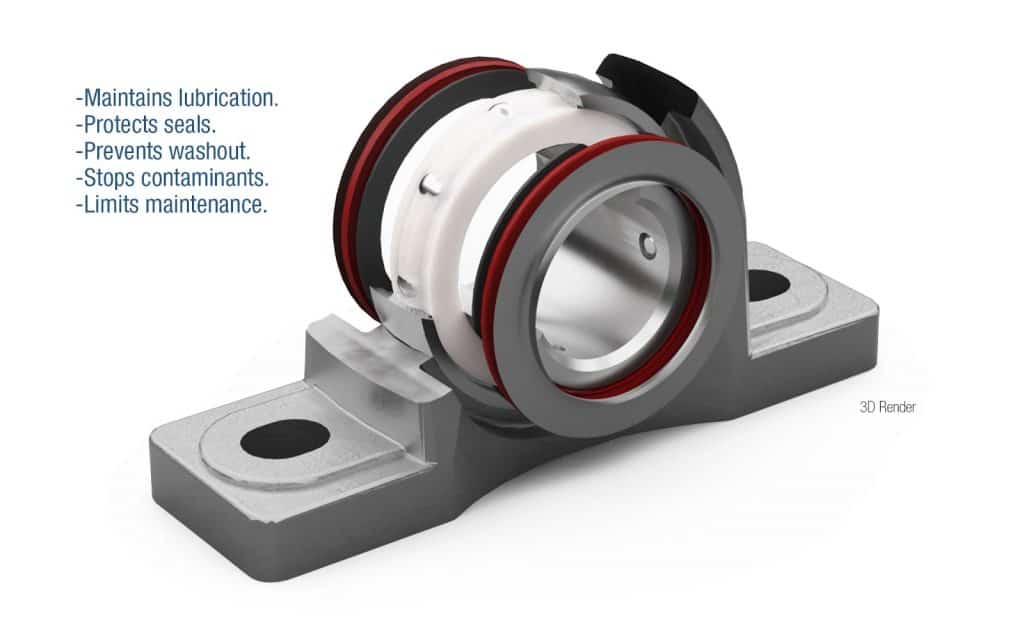What Is Solid Lubrication?

Solid lubrication, at its most basic, is a replacement for bearing grease. 90% of bearing applications utilize grease, where lubrication-related issues make up approximately 80% of premature bearing failures1! Somehow we’ve come to accept this as a normal cost of business. Fortunately, there is a more comprehensive lubrication system available.
Not only does solid lubrication completely change how a bearing is lubricated, but it also provides these additional benefits in many applications:
- Increased bearing longevity
- Elimination of maintenance
- Reduced oil loss from washout
For greased bearings, their optimal function is entirely reliant on the user to get the lubrication process right. Greased bearings perform only as well as you maintain them.
Interested in extending bearing life in your applications? The following sections are for you.
How does solid lubrication work?
Solid lubrication is a polymer material that is molded into the bearing cavity. This material consists of countless micro-pores containing oil. The oil is released as the bearing operates, and when at rest, the pores reabsorb the oil.
All the oil the bearing requires for its entire lifespan is within these micro-pores, holding as much as four times the oil that a standard greased bearing would.

The greasing process contains many variables which have the potential to jeopardize bearing life, such as:
- mounted bearings requiring an ideal grease fill,
- an unknown quantity or quality of grease within a bearing,
- grease incompatibilities creating harmful deposits,
- and the introduction of contaminants through manual greasing.
Grease is mostly oil. Thickeners and additives can modify the purpose and performance of the lubricant; for example, the need to resist high heat or extreme pressure. By reducing the lubrication within a bearing to just the oil, you eliminate issues related to greasing. No more manual lubrication, lubrication lines, or an intricate lubrication system.
Bearings that include solid lubrication no longer require relubrication.
The advantages of solid lubricants
Ideally, it fills the entire bearing cavity without impeding the rolling elements and the physical nature of the polymer adds another layer of protection that grease alone could never offer.

Protecting against contamination
Importantly, when contamination enters the interior of a greased bearing, it will circulate with the grease, causing damage. Solid lubrication stops any contaminant that manages to work its way past the seal, keeping it away from the elements and races and preventing an inevitable failure.
In dusty or dirty applications, solid lubrication’s ability to keep out contaminants considerably improves bearing life.
Limiting the infiltration of liquids
The polymer in solid lubrication limits the ability of water and cleaners to wash away oil, a problem known as washout. In contrast, the oil film between ball and race is more susceptible in greased bearings. The less oil within a bearing, the higher the risk of a catastrophic failure.
When should I use solid lubrication?
Beyond improving basic bearing operation, solid lubrication technology is an excellent solution for more complex applications such as applications subjected to heavy contamination, hard to reach locations, or those involving frequent washdowns.
Solid lubrication and washdowns
Let’s begin with industries and applications that require occasional or regular washdowns with water or cleaners. For example food and beverage processing, pharmaceutical or chemical industries, contaminated applications, or those with salt-water exposure. Solid lubrication reduces bearing failures in these applications by:
- lending additional strength to the seals, decreasing the risk that they will deform or become compromised,
- reducing the likelihood of oil being washed away or emulsified (mixed with water) during high-pressure cleanings,
- and maintaining high levels of oil retention during operation, minimizing contamination of surrounding areas, and reducing cleaning frequency.
Solid lubrication for agricultural applications
Agricultural industries, by their nature, are dirty. While it would not be uncommon for ag bearings to experience washdowns, the potential for bearing contamination is a more significant issue. These industries actively work against the clock, having little time to manage repairs with so much work to do. Any delay in production is a costly setback.
Solid lubrication can be especially effective in these industries by:
- providing protection to the rolling elements as a secondary sealing system, minimizing the potential damage contaminants can cause,
- eliminating otherwise-required bearing maintenance, such as relubrication, in the field,
- and applying them in stainless steel mounted bearings, effectively negating the damaging effects of water, humidity, sun exposure, and dirt.
Use solid lubrication to reduce bearing maintenance
Many bearings are in unusual or hard-to-reach places, creating safety concerns and scheduling issues for maintenance technicians. Not only does the process of regreasing these bearings take time and considerable effort, but some can also be potentially dangerous to access. Bearings containing solid lubrication are lubricated for life, limiting interactions to installation and replacement.

A solid lubrication system simplifies bearing maintenance, making operations more efficient and more profitable.
Remember, lubrication-related issues result in as much as 80% of premature bearing failures. By replacing greased bearings with those having solid lubrication, elimination of the human element from bearing maintenance is possible. This allows for:
- more focused and preventative maintenance,
- a reduction in time and costs associated with bearing lubrication,
- and the elimination of lubrication-related mistakes.
Solid lubrication is a drastic change from how we currently view the relationship between lubrication and bearings. The benefits provide reduced long-term costs and longer uptimes for a wide range of applications across many industries.
Would a reduction in bearing failures benefit your application? Visit the Lubrilife website to explore more.
1Radu, Ciprian. The Most Common Causes of Bearing Failure and the Importance of Bearing Lubrication. 2010.
Sort by category: Installation & Maintenance, Lubrication, Selection & Design
Sort by topic: Bearing Grease, Lubrication System


